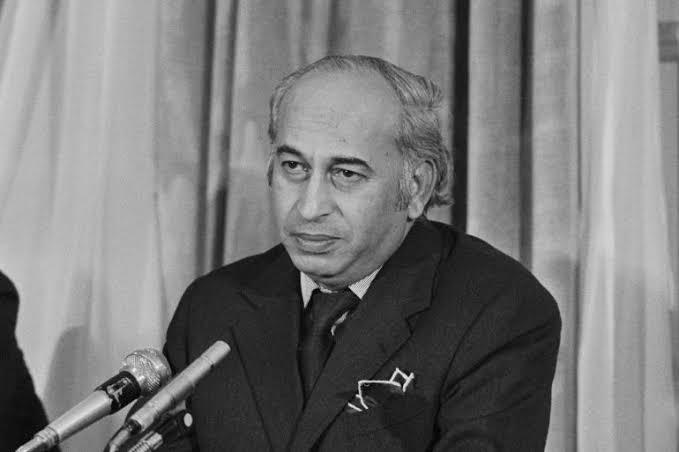1979: Pakistan's Former Prime Minister - Zulfikar Ali Bhutto, is Executed

In 1979, Pakistan witnessed a gripping chapter in its political history when former Prime Minister Zulfikar Ali Bhutto was executed, marking a tragic end to his tenure as the nation’s first democratically elected leader. Bhutto's rise to power and subsequent downfall unfolded under the shadow of a controversial trial orchestrated by the military dictator General Zia-ul-Haq. The trial's dubious nature raised eyebrows both domestically and internationally, igniting fierce debates about justice, democracy, and the rule of law.
Bhutto's death did not merely end a political career; it ignited a lasting legacy that continues to shape Pakistan's political landscape. His execution symbolized the struggles between democratic ideals and authoritarian rule, leaving an indelible mark on future generations. As we delve into the events leading to Bhutto's execution and examine its profound impact on Pakistan, we uncover a pivotal moment that continues to resonate in the country's ongoing quest for democratic governance.

The controversial trial that led to Bhutto's execution in 1979
In 1979, Zulfikar Ali Bhutto faced a highly contentious trial that culminated in his execution, an event that shocked both Pakistan and the international community. Following a coup d'état by General Zia-ul-Haq, Bhutto was arrested and charged with conspiracy to commit murder in the case of the assassination of a political opponent, Nawab Mohammad Ahmad Khan Kasuri. The trial was marred by allegations of bias and judicial misconduct, with critics arguing that the military regime manipulated the legal system to eliminate Bhutto, a formidable political rival. His supporters viewed the specifics of the case as a ruse to silence a leader who was deeply committed to democratic governance in Pakistan.
The nature of the trial raised serious questions about the fairness and impartiality of Pakistan's judicial system under military rule. Many believe that the courts prioritized political expediency over justice, as the military government sought to tighten its grip on power. Bhutto's defense team presented compelling evidence aimed at exonerating him, but the verdict was predetermined by a judiciary perceived as loyal to the military regime. As a result, the international outcry that followed his hanging on April 4, 1979, not only highlighted the flaws in the trial process but also ignited debates about the legitimacy of military rule and the political future of Pakistan. The execution remains a pivotal moment in the nation's history, encapsulating the struggle between democracy and authoritarianism in a young but tumultuous state.

Zulfikar Ali Bhutto: A legacy of democracy cut short
Zulfikar Ali Bhutto emerged as a prominent political figure in Pakistan, serving as the country’s first democratically elected Prime Minister from 1973 until his ousting in 1977. His charismatic leadership style and vision for a modern Pakistan captured the imaginations of a nation yearning for progress. Bhutto championed significant social reforms, spearheaded policies aimed at land redistribution, and initiated key economic programs, all in pursuit of a more equitable society. However, his tenure was also marked by political strife and accusations of authoritarianism, as he cracked down on dissent and opposition parties, paving the way for growing discontent.
The military coup in 1977, led by General Zia-ul-Haq, ended Bhutto's ambitions and marked a drastic shift in Pakistan's political trajectory. After the coup, Bhutto was arrested and subjected to a contentious trial, which many viewed as politically motivated. As his execution approached in 1979, Bhutto's legacy became a symbol of lost democratic ideals in Pakistan. The controversy surrounding his trial and subsequent death raised significant questions about the rule of law, fairness, and the misuse of power in the name of nationalism. Bhutto's legacy as a reformist leader remains a double-edged sword; it inspires both admiration for his vision of democracy and caution due to the tumultuous events that defined his life.

The enduring impact of Bhutto's execution on Pakistan's political landscape
Zulfikar Ali Bhutto's execution in 1979 deeply altered Pakistan's political landscape and set a precedent for military influence in civilian governance. Following his death, political parties struggled to establish a stable democracy, as the military tightened its grip on power under General Zia-ul-Haq. The fear of repression silenced dissent and led to a culture of political instability. In the years that followed, Bhutto's execution became a rallying cry for opposition movements, inspiring generations of activists who viewed his death as a symbol of resistance against authoritarian rule. His legacy transformed into a powerful narrative that fueled calls for democratic reform and social justice, echoing through Pakistan's tumultuous political history.
Moreover, Bhutto's execution highlighted the volatility of Pakistan's democratic institutions, leading to cycles of military rule and fragile democratic transitions. The events surrounding his trial and subsequent hanging sparked widespread protests, illustrating the populace’s desire for democratic governance. Even decades later, Bhutto's legacy permeates the fabric of Pakistani politics, influencing contemporary leaders and political discourse. Pakistanis often invoke his name and ideas in discussions on governance, democracy, and social equity. Thus, the events of 1979 continue to resonate, reminding the nation of the fragile state of democracy and the ongoing struggle for political rights and freedoms.

